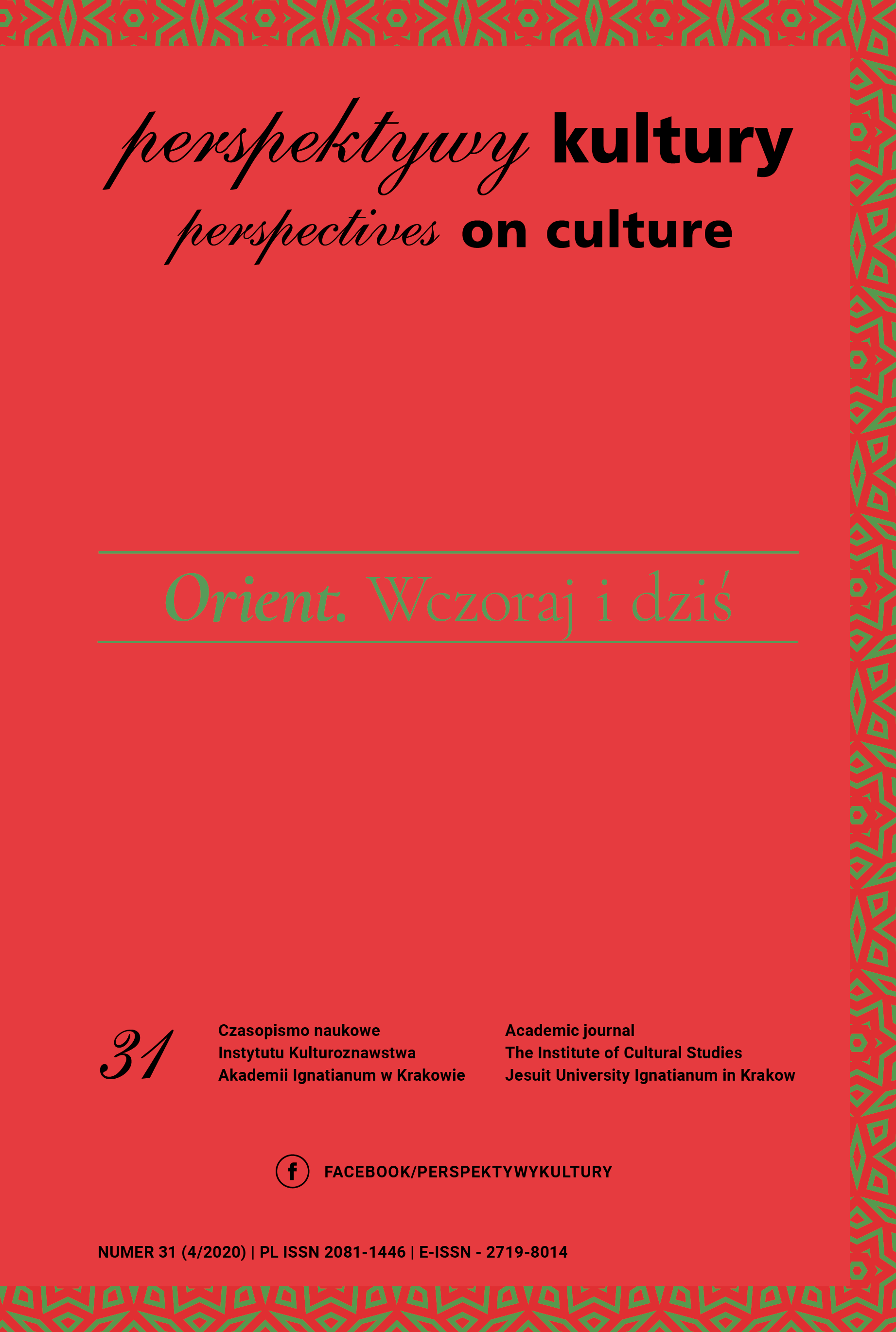Literary Representation of the Self in Medieval Arabic Autobiographies and the Cultural Barriers to Self‑Cognition. The Literacy Theory Perspective. Part 2
Abstract
This article addresses the problems associated with the relationship between the influence of writing on cognitive processes and the features of the culture within which writing appears. Classical literacy theory, with the modifications that were introduced over the course of time, was embraced as the research perspective. According to these modifications, the change in the cognitive processes and content which occurs under the influence of writing is not automatic. Every culture has at its disposal a specific array of factors which influence writing and literacy and which determine the extent to which the potential of writing will be used. The aim of this article is to demonstrate the most important cultural norms and values which, by being practiced socially, could have limited the influence of writing on self-cognitive processes—the consequences of such processes can be found in the literary representation of the self in medieval Arabic autobiographies of the 12th–15th centuries. These features were referred to as traditionalism, the domination of collective awareness over individual awareness, the acceptance of social hierarchical structure, and a Quranic vision of the limits to man’s freedom.
References
Abū Shāma, Shihāb ad-Dīn ‘Abd al-Rah????mān. (1974). Adh-Dhayl ‘ala-r-rawd????atayn, ‘I. al-H????usaynī ad-Dimashqī (Ed.). Beirut: Dār al-Jayl.
Enderwitz, S. (1998). From Curriculum Vitae to Self-narration. Fiction in Arabic Autobiography. In S. Leder (Ed.), Story-telling in the Framework of Non-fictional Arabic Literature (pp. 1–19). Wiesbaden: Harrassowitz Verlag.
Enderwitz, S. (2007). Autobiography and “Islam”. In O. Akyıldız, H. Kara & B. Sagaster (Eds.), Autobiographical Themes in Turkish Literature: Theoretical and Comparative Perspectives (pp. 35–42). Würzburg: Ergon Verlag.
Al-Ghazālī, Abū H????āmid. (1980). Deliverance from Error (al-Munqidh min al-Dalāl) (R.J. McCarthy, Trans.). Boston: Twayne, American University in Beirut.
Al-Ghazālī, Abū H????āmid. (1992). Al-Munqidh min ad????-d????alāl (M. Bijū, Ed.). Damascus.
Al-Ghazālī, Abū H????āmid. (2001). Deliverance from Error and Mystical Union with the Almighty (M. Abulayah, Trans.). Washington D.C.: The Council for Research in Values and Philosophy.
Giladi, A. (1992). Children of Islam: Concepts of Childhood in Medieval Muslim Society. London: Macmillan.
von Grunebaum, G.E. (1971). Medieval Islam: A Study in Cultural Orientation. Chicago—London: The University of Chicago Press.
Guillaume, A. (Ed. & Trans.). (2004). The Life of Muh????ammad. A Translation of Ish????āq’s Sīrat Rasūl Allāh. Karachi: Oxford University Press.
Gurevich, A. (1985). Categories of Medieval Culture. London—Boston—Melbourne—Henley: Routledge & Kegan Paul.
Haslam, A. (2004). Psychology in Organizations. The Social Identity Approach. London: Sage Publications.
Hofstede, G. (2001). Culture’s Consequences. Comparing Values, Behaviors, Institutions and Organizations across Nations. London—New Delhi: Sage Publications.
Hofstede, G., Hofstede, G.J. & Minkov, M. (2010). Cultures and Organizations. Software for the Mind. New York: McGrow Hill.
Izutsu, T. (2002). Ethico-Religious Concepts in the Qur’ān. Montred & Kingstad—London—Ithaca: McGill-Queen’s University Press.
Izutsu, T. (2008). God and Man in the Qur’ān. Semantics of the Qur’ānic Weltanschauung. Tokyo: Keio University Press.
Kadivar, M. (2003). The Public, Private, and Islam. Social Research 570/3: 659–680.
Kmita, J. (1982). O kulturze symbolicznej. Warszawa: Centralny Ośrodek Metodyki Upowszechniania Kultury.
Lane, E.W. (2003). Arabic-English Lexicon (CD-ROM ed.). Vadus, Liechtenstein: Thesaurus Islamicus Foundation.
Lindsay, J.E. (2005). Daily Life in the Medieval Islamic World. Westport, Connecticut—London: Westwood Press.
Lowry, J.E. (1997). Time, Form, and Self: Autobiography of Abū Shama. Edebiyāt 7: 313–325.
Mrozek, A. (1967). Koran a kultura arabska. Warszawa: Książka i Wiedza.
Nasalski, I. (2006). Kiedy muzułmanin porzuca swą wiarę. Apostazja w islamie. Teofil. Pismo Kolegium Filozoficzno-Teologicznego Dominikanów 2 (24): 101–124.
Ong, W.J. (2005). Orality and Literacy. The Technologizing of the Word. London—New York: Routledge.
Pilarska, A. (2012). Ja i tożsamość a dobrostan psychiczny. Poznań: Wydawnictwo Naukowe Wydziału Nauk Społecznych UAM.
Prochwicz-Studnicka, B. (2020). Literary Representation of the Self in Medieval Arabic Autobiographies and the Cultural Barriers to Self-Cognition. The Literacy Theory Perspective. Part 1. Perspektywy Kultury 30: 135–150.
The Qur’an. A New Translation (A.M.A.S. Haleem, Ed. & Trans.). (2004). Oxford: Oxford University Press.
Radtke, B. & O’Kane, J. (1996). The Concept of Sainthood in Early Islamic Mysticism. Two Works by Al-Hakim At-Tirmidhi. An Annotated Translation with Introduction. Richmond, Surrey: Curzon Press.
Rapoport, Y. (2005). Marriage, Money, and Divorce in Medieval Islamic Society. Cambridge—New York—Melbourne: Cambridge University Press.
Reynolds, D.E. (2001). Interpreting the Self: Autobiography in the Arabic Literary Tradition. Berkeley: University of California Press.
Robinson, Ch.F. (2007). Islamic Historiography. Cambridge: Cambridge University Press.
Rosenthal, F. (2007). Knowledge Triumphant. The Concept of Knowledge in Medieval Islam. Leiden: Brill.
Rosenthal, F. (2014a). Child Psychology in Islam. In D. Gutas (Ed.), Man versus Society in Medieval Islam (pp. 941–964). Leiden—Boston: Brill.
Rosenthal, F. (2014b). Materials for an Appraisal of Knowledge as Societal Force. In D. Gutas (Ed.), Man versus Society in Medieval Islam (pp. 967– 1000). Leiden—Boston: Brill.
As????-S????uyūt????ī, Jalāl ad-Dīn. (1975). Kitāb at-tah????adduth bi-ni‘mat Allāh (E.M. Sartain, Ed.). Cambridge: Cambridge University Press.
Turner, J.C. (1982). Towards a Cognitive Redefinition of the Social Group. In Social Identity and Inter Group Relations (H. Tajfel, Ed., pp. 15–40). Cambridge UK: Cambridge University Press.
Yāqūt al-H????amawī, Ibn ‘Abd Allāh. (1993). Mu‘jam al-udabā’. Irshād al-arīb ilā ma‘rifat al-adīb (I. ‘Abbās, Ed., Vol. 5). Beirut: Dār al-Gharb al-Islāmī.
Copyright (c) 2020 Jesuit University Ignatianum in Krakow

This work is licensed under a Creative Commons Attribution-NoDerivatives 4.0 International License.
Autor, zgłaszając swój artykuł, wyraża zgodę na korzystanie przez Wydawnictwo Uniwersystet Ignatianum z utworu na następujących polach eksploatacji:
- utrwalania utworu w formie papierowej, a także na nośniku cyfrowym lub magnetycznym;
- zwielokrotnienia utworu dowolną techniką, bez ograniczenia ilości wydań i liczby egzemplarzy;
- rozpowszechniania utworu i jego zwielokrotnionych egzemplarzy na jakimkolwiek nośniku, w tym wprowadzenia do obrotu, sprzedaży, użyczenia, najmu;
- wprowadzenia utworu do pamięci komputera;
- rozpowszechniania utworu w sieciach informatycznych, w tym w sieci Internet;
- publicznego wykonania, wystawienia, wyświetlenia, odtworzenia oraz nadawania i reemitowania, a także publicznego udostępniania utworu w taki sposób, aby każdy mógł mieć do niego dostęp w miejscu i czasie przez siebie wybranym.
Wydawca zobowiązuje się szanować osobiste prawa autorskie do utworu.





